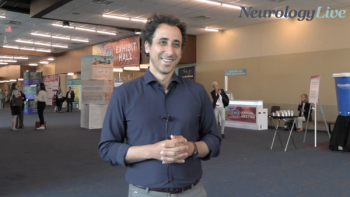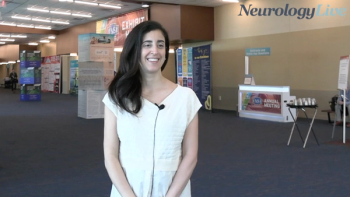
Sam Hooshmand, DO, assistant professor of neurology at the Medical College of Wisconsin, discussed the complexities of defining, diagnosing, and managing advanced MS.

Sam Hooshmand, DO, assistant professor of neurology at the Medical College of Wisconsin, discussed the complexities of defining, diagnosing, and managing advanced MS.

A patient and neurologist discussed the importance of individualized treatment strategies and the role of shared decision-making in managing multiple sclerosis. [WATCH TIME: 5 minutes]

Neurology News Network. for the week ending June 7, 2025. [WATCH TIME: 4 minutes]

The associate vice president of research at the National MS Society discussed a growing research initiative focused on defining and promoting evidence-based psychosocial wellness strategies for individuals with MS. [WATCH TIME: 6 minutes]

Take 5 minutes to catch up on NeurologyLive®'s highlights from the week ending June 6, 2025.

A patient living with MS and MS clinical expert reflected on the varied and often-misdiagnosed early symptoms that can signal the onset of the autoimmune disease. [WATCH TIME: 6 minutes]

Ahmed Abdelhak, MD, assistant professor of neurology at the UCSF, discussed the evolving landscape of biomarkers in multiple sclerosis and their potential to transform remyelination approaches.

A recent study revealed that rizatriptan was ineffective for treating vestibular migraine attacks, showing limited symptom relief compared with placebo.

The executive director of The Sumaira Foundation discussed a newly funded international trial assessing both approved and off-label NMOSD therapies to better inform treatment decisions and patient care. [WATCH TIME: 2 minutes]

New data reveals RGX-202 gene therapy shows significant improvements in Duchenne muscular dystrophy patients, enhancing disease management and safety.

A patient living with MS and MS clinical expert reflected on the varied and often-misdiagnosed early symptoms that can signal the onset of the autoimmune disease. [WATCH TIME: 6 minutes]

Phil Lambert, PhD, chief scientific officer at Satellos Bioscience, discusses the rationale and early clinical progress of SAT-3247, a novel regenerative therapy targeting muscle stem cells in Duchenne muscular dystrophy.

The director of the John A. Schafer, MD Multiple Sclerosis Achievement Center at Dignity Health highlighted the significant impact of loneliness in individuals with multiple sclerosis. [WATCH TIME: 6 minutes]

The UNITE trial reveals fremanezumab's effectiveness in treating migraine and comorbid depression, offering hope for patients with overlapping conditions.

The assistant professor of neurology at the University of California, San Francisco discussed current advancements and ongoing challenges in identifying biomarkers to accurately monitor remyelination in MS clinical trials. [WATCH TIME: 5 minutes]

AJ201 shows promising safety and efficacy in treating spinal and bulbar muscular atrophy, marking a potential breakthrough for patients.

The professor of neurology at the Miami Miller School of Medicine detailed the clinical potential of Cognivue’s Amyloid Risk Measure (CARM) for identifying individuals with cognitive impairment likely related to amyloid pathology. [WATCH TIME: 5 minutes]

Josh Bryson, PhD, head of Medical Affairs at Argenx, discussed the safety profile of efgartigimod in light of recent FAERS-based infection data and offered clinical context for patient care.

The assistant professor of neurology at Mayo Clinic College of Medicine and Science outlined a case of myelin oligodendrocyte glycoprotein antibody-associated disease from diagnosis to long-term management. [WATCH TIME: 5 minutes]

The associate vice president of research at National MS Society talked about the need for evidence-based wellness strategies in multiple sclerosis, particularly focusing on psychosocial interventions.

Findings from a late-breaking poster presented at CMSC 2025 suggest that CBT does not improve fatigue severity or impact in patients with multiple sclerosis.

The assistant professor in the Department of Neuroscience at Université de Montréal discussed key clinical factors influencing DMT selection in patients newly diagnosed with multiple sclerosis. [WATCH TIME: 5 minutes]

Recent analysis confirms cladribine's safety for multiple sclerosis, showing no increased pregnancy risks and effective long-term outcomes in patients.

New long-term data reveals ponesimod's effectiveness in reducing relapses and MRI lesions in relapsing multiple sclerosis patients, ensuring safety over 8.2 years.

Neurologists advocate for personalized treatment approaches in older MS patients, emphasizing the importance of individual assessment over age-based rules for DMT discontinuation.

The professor of pediatrics in neurology at the University of Toronto discussed differences in disease course, treatment strategy, and trial challenges of MOG-associated disorders in pediatric versus adult patients. [WATCH TIME: 5 minutes]

Fenebrutinib shows promising results in reducing relapse rates and disability progression in relapsing multiple sclerosis patients over two years.

The assistant professor of neurology at Barrow Neurological Institute talked about the lack of public awareness for hypertension among individuals with MS despite many meeting diagnostic criteria. [WATCH TIME: 6 minutes]

A recent study reveals that patients on ofatumumab experience fewer worsening MS symptoms compared to those on ocrelizumab, enhancing treatment stability.

Here's some of what is coming soon to NeurologyLive® this week.